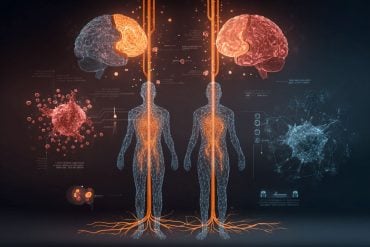Author: Researchers developed DEPLOY, an AI tool that can classify brain tumors into 10 major subtypes with 95% accuracy. The tool analyzes microscopic images of tumor tissue, providing a faster and more accessible alternative to DNA methylation-based profiling. DEPLOY could potentially be used to classify other cancers as well.
Key Facts:
- DEPLOY can classify brain tumors with 95% accuracy.
- The AI tool analyzes microscopic images of tumor tissue.
- DEPLOY is a faster and more accessible alternative to DNA methylation-based profiling.
Source: Australian National University
A new AI tool to more quickly and accurately classify brain tumours has been developed by researchers at The Australian National University (ANU).
According to Dr Danh-Tai Hoang, precision in diagnosing and categorising tumours is crucial for effective patient treatment.

“The current gold standard for identifying different kinds of brain tumours is DNA methylation-based profiling,” Dr Hoang said.
“DNA methylation acts like a switch to control gene activity, and which genes are turned on or off.
“But the time it takes to do this kind of testing can be a major drawback, often requiring several weeks or more when patients might be relying on quick decisions on therapies.
“There’s also a lack of availability of these tests in nearly all hospitals worldwide.”
To address these challenges, the ANU researchers, in collaboration with experts from the National Cancer Institute in the United States (US), developed DEPLOY, a way to predict DNA methylation and subsequently classify brain tumours into 10 major subtypes.
DEPLOY draws on microscopic pictures of a patient’s tissue called histopathology images.
The model was trained and validated on large datasets of approximately 4,000 patients from across the US and Europe.
“Remarkably, DEPLOY achieved an unprecedented accuracy of 95 per cent,” Dr Hoang said.
“Furthermore, when given a subset of 309 particularly difficult to classify samples, DEPLOY was able to provide a diagnosis that was more clinically relevant than what was initially provided by pathologists.
“This shows the potential future role of DEPLOY as a complementary tool, adding to a pathologist’s initial diagnosis, or even prompting re-evaluation in the case of disparities.”
The researchers believe DEPLOY could eventually be used to help classify other types of cancer as well.
About this brain cancer and AI research news
Author: Jessica Fagan
Source: Australian National University
Contact: Jessica Fagan – Australian Nation University
Image: The image is credited to Neuroscience News
Original Research: Closed access.
“Prediction of DNA methylation-based tumor types from histopathology in central nervous system tumors with deep learning” by Danh-Tai Hoang et al. Nature Medicine
Abstract
Prediction of DNA methylation-based tumor types from histopathology in central nervous system tumors with deep learning
Precision in the diagnosis of diverse central nervous system (CNS) tumor types is crucial for optimal treatment. DNA methylation profiles, which capture the methylation status of thousands of individual CpG sites, are state-of-the-art data-driven means to enhance diagnostic accuracy but are also time consuming and not widely available.
Here, to address these limitations, we developed Deep lEarning from histoPathoLOgy and methYlation (DEPLOY), a deep learning model that classifies CNS tumors to ten major categories from histopathology.
DEPLOY integrates three distinct components: the first classifies CNS tumors directly from slide images (‘direct model’), the second initially generates predictions for DNA methylation beta values, which are subsequently used for tumor classification (‘indirect model’), and the third classifies tumor types directly from routinely available patient demographics.
First, we find that DEPLOY accurately predicts beta values from histopathology images.
Second, using a ten-class model trained on an internal dataset of 1,796 patients, we predict the tumor categories in three independent external test datasets including 2,156 patients, achieving an overall accuracy of 95% and balanced accuracy of 91% on samples that are predicted with high confidence.
These results showcase the potential future use of DEPLOY to assist pathologists in diagnosing CNS tumors within a clinically relevant short time frame.






